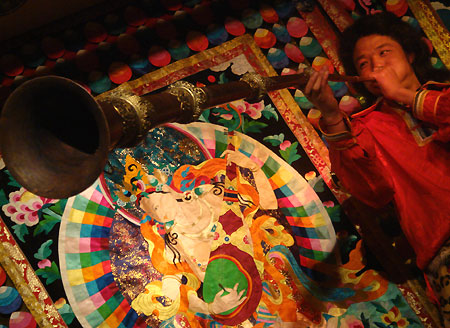Authentic Tibetan Décor
On top of stage performances, Tibetan-styled décor is also important. "Authentic decor will make diners feel they are dining in Tibetan homes," said the Gesangmedo manager surnamed Deng, who runs the Tibetan restaurant in Sanlitun.
 A Tibetan performer plays a fahao, a Tibetan brass instrument mainly used in Tibetan religious ceremonies, in Norbulindka, a Tibetan restaurant at Beijing's Nuren jie in Chaoyang District, May 23, 2008. In the background hangs a piece of Duixiu embroidery, a kind of traditional Tibetan handicraft that is made of colorful silk-fabric pieces. [chinadaily.com.cn]
A Tibetan performer plays a fahao, a Tibetan brass instrument mainly used in Tibetan religious ceremonies, in Norbulindka, a Tibetan restaurant at Beijing's Nuren jie in Chaoyang District, May 23, 2008. In the background hangs a piece of Duixiu embroidery, a kind of traditional Tibetan handicraft that is made of colorful silk-fabric pieces. [chinadaily.com.cn] |
About 70 percent of Gesangmedo's patrons are foreigners, who seem to enjoy the restaurant's Tibetan cultural flavor more than the food, according to a waiter at the three-year-old outlet near the Canadian embassy.
"Sophisticated décor is expensive, yet it is worthwhile, appealing to visitors from home and abroad," echoed Dong Qian, the owner of Norbulindka, who completed restaurant renovations just three months before the Games. Dong said she hoped her restaurant could help make Tibetan culture better known.
However, not everyone is focusing on interior design. Manilongda Dongkar Art Bar is a moderately decorated eatery near the Lama Temple.
"Décor in my restaurant has nothing to do with how magnificent it is," said owner Dong Cuo as she pointed to a
Mani stone pile casually placed in a corner. "Diners can also find typical Tibetan artwork like
Thangka paintings and
Mani stones here, yet it is in a natural way."
The small restaurant, less expensive than most of its rivals, is one of the few with no evening performances. Moreover, none of its waiters are dressed in Tibetan costumes, although they are Tibetans who usually speak their native tongue with its Tibetan patrons.
"We want to make diners feel at home, a home that is not necessarily magnificent but comfortable enough to dine in," said Dong Cuo, its customers are mainly Tibetans living in Beijing.
"Lamas from the nearby Lama Temple are among our regular customers, who love our affordable homemade dishes as well as the tranquil atmosphere."